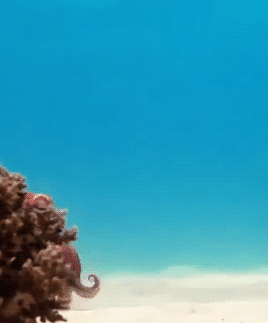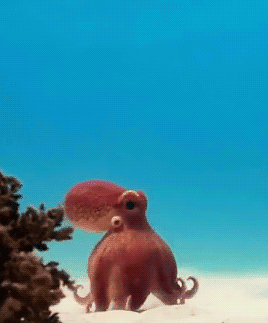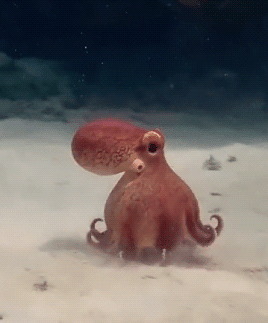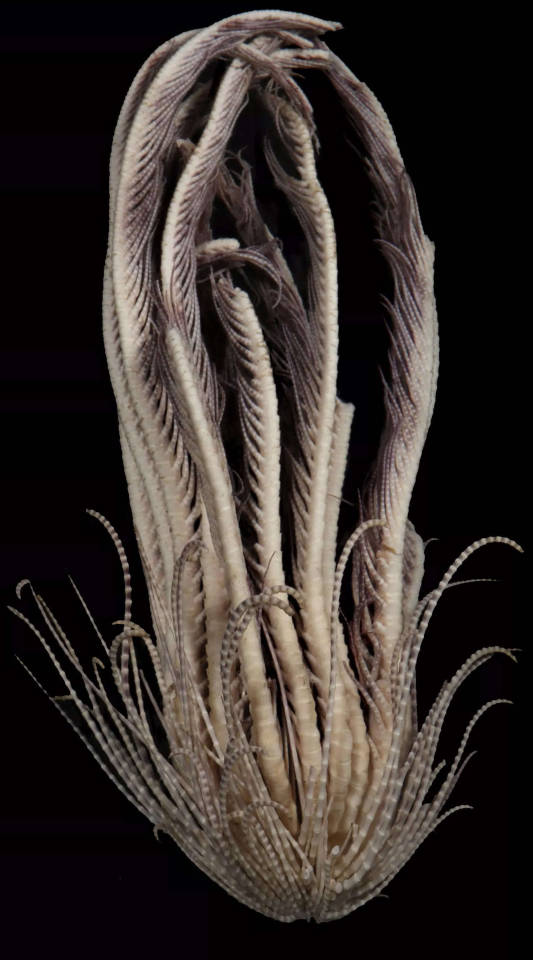Is It Known What Baby Coelacanths Look Like??
Is it known what baby coelacanths look like??
Yes! An expedition filmed one in Manado Bay, North Sulawesi, Indonesia in 2009!

"It was measured by a laser beam from the R.O.V. to be 31.5cm. The fish was positioning itself in a small cave."
More Posts from Mermaidfrenzy and Others

sharks are just like giant kitties tbh. they’re just curious silly little creatures. they’re just interested in what’s around them. they bite you the same way a cute little kitty bites you. they’re just trying to get to know you. why do you hate them so so much they think you’re interesting and they’re cute. leave them alone

Daily Cephalopod #58

Newly Explored Deep Sea Octopus Nursery Is Just the Third Ever Discovered
A recent expedition to the waters of Costa Rica has yielded new discoveries about deep sea octopuses.
Marine scientists appear to have found some more natural wonders of the ocean: not one, but two deep-sea octopus nurseries in the waters of Costa Rica. One of these nurseries was previously thought to be inhospitable for eggs to hatch in, while the other was undiscovered until now. The team of scientists also believe that the octopuses nursing there might be a novel species, and the area itself is teeming with other sea life. Octopuses are generally considered to be solitary creatures. But there are some species known to be exceptions to this rule, and some circumstances where normally isolated octopuses will group together. In recent years, scientists have come across parts of the ocean filled with hundreds or more of octopus mothers protecting their eggs until they hatch—so-called nurseries. These gatherings are also sometimes called octopus gardens...
Read more: https://gizmodo.com/newly-explored-deep-sea-octopus-nursery-is-just-the-thi-1850591141

Daily Cephalopod #2
So true bestie what did you say btw i was dissociating



Daily Jellyfish: Day 4
Cauliflower Jellyfish
Fun Facts
Cauliflower Jellyfish are considered one of the most venomous in the medusa genus although it isn’t harmful against humans
They are considered a culinary delicacy and used for medical purposes in China and Japan
Their lifespan is 3-6 months
Shark Dump: Lemon Sharks!
Some of you seemed to enjoy my shark facts and honestly, if I can get the chance to rave about sharks, I will. So here are some shark facts starting with my favorite, Lemon Sharks!!
If you guys enjoy this, feel free to leave me a request with the name of a shark you'd like to learn about and I'll be happy to info dump on them. I'm thinking about posting one every Sunday (Shark Sundays!!! :D )
Technically I was supposed to post this earlier but I didn't lol oops-

Conservation Status: NEAR THREATENED
This cute guy here is a Lemon shark or Negaprion brevirostris! They get this name from their yellowish skin and yellow bellies but they can be anywhere from brown to olive colored. Lemon sharks are mostly native to the Atlantic Ocean and parts of the Pacific where they occupy coral keys, mangrove forests, bays and even docks. Most populations can be found in Gulf of Mexico, the West Indies, and the Caribbean.
They can grow up to 11 ft long which makes them one of the larger species of sharks but don't let their size scare you! These guys are mostly scavengers that hunt for food near sandy in-shore areas. Most of the lemon sharks diet consists of bony fish, crustaceans and stingrays although they occasionally snack on seabirds or smaller sharks. They hunt using electroreceptors on their nose, called ampullae de Lorenzini, which help them detect fish and other creatures, even buried in the sand.
(Remember, sharks don't have hands so they rely on their nose and mouth to explore the enviroment around them!)
Lemon sharks usually live in oceanic waters that are no deeper than 188 ft although some have been found in waters at depths of up to 300 ft. They are one of 43 sharks that can swim in freshwater but usually don't travel very far into these waters as they can't survive for long periods in them. If you see a lemon shark in freshwater, they're probably just there for a quick bite to eat before heading back to the ocean.
Fun Fact: Bull sharks are the only shark that can survive in both salt and fresh water! They're also one of the dumber sharks and will try to eat anything that fits in their mouths.
Despite how scary they look, lemon sharks are actually a favorite among divers and marine biologist because of their docile behavior! They rarely attack humans (As of 2011, researchers had found only 10 cases of lemon sharks attacking humans, and none of these cases were deadly), in fact, they are very shy and usually try to avoid us. Though if they do approach, they're usually just being curious and will bump you with their nose.

But my favorite thing about lemon Sharks? Once they get over their shyness, they LOVE getting belly rubs! They find the sensation very pleasant and will actively seek out the divers who pet them, even chasing other sharks away if they feel the diver’s giving them too much attention. Sometimes, if you rub their belly too much or if you stimulate the tiny sensory pores located on their snout, you can put them into something called tonic immobility.
Tonic immobility is a reflex that causes a temporary state of inactivity in an animal. Similar to hypnosis! Researchers aren't sure why sharks do this as it's usually thought to be a prey instinct so apex predators like sharks shouldn't have this. But most researchers have found that the sharks aren't stressed when they perform this behavior so it might just mean they're really relaxed! This is backed up by the fact that when in this state the shark’s muscles relax and their breathing becomes deep and rhythmic. Sharks usually enter tonic immobility in less than a minute and they can remain in this state for up to 15 minutes. It doesn't hurt them at all and researches use this to help subdue them.
Lemon sharks (like many other sharks) are imperative to keeping our reefs alive and healthy. Without them, we've already begun to see a major decline in coral reefs and seagrass beds. By taking these sharks out of the coral reef ecosystem, there's nothing to keep the larger predatory fish in check and they overfeed on the herbivores. With less herbivores, macroalgae expands and coral can no longer compete, shifting the ecosystem to one of algae dominance causing the reefs to eventually die out.
Now, back to lemon sharks and the most important fact I have about them: their conservation status.
Lemon sharks are considered to be near threatened. This means that they are likely to become endagered in the near future. This is because they are targeted by commercial and recreational fishermen primarily due to their highly prized fins. Their meat is also in high demand and is considered a delicacy in many areas. Further, the continuing destruction of their habitat has led to the severe decline of lemon shark populations.
But thankfully, there are steps already being taken to help protect these sweet sea puppies. The Florida Fish and Wildlife Conservation Commission prohibits the harvesting of lemon sharks in state waters. Any lemon shark that catches onto a hook is to be released immediately, either by removal of the hook from the shark or by cutting the shark free—whichever will release the shark quickest. Some countries are also slowly starting to put in protections for them as well.
You can also help! Many people view sharks as blood-thirsty monsters due to decades of slander campaigns and hollywood scare movies (I'm glaring at you Jaws). But we can change that view by showing the world just how beautiful and intelligent these creatures really are! The more informed people are about the sharks, the more we can do to help them. Just by reading this post and learning about lemon sharks, you're helping! Now, the next time you hear someone talking smack about sharks, you can smack them with some cool shark facts! Then hopefully with enough smacking, we can change how people see these lovely predators and get more support for their protection.




Cutie-pie of the sea (x)
*Update: this is not a real octopus but a spy bot for research. In a BBC vid(here), the spy bot helps an octopus to protect itself from sharks.

Antarctic strawberry feather star (Promachocrinus fragarius), Alien-Like Antarctic Feather Star With 20 Legs Joins Four New-To-Science Species
-
 girlhelp2003 liked this · 1 year ago
girlhelp2003 liked this · 1 year ago -
 purpledragonfollower liked this · 1 year ago
purpledragonfollower liked this · 1 year ago -
 shadowlugia711 reblogged this · 1 year ago
shadowlugia711 reblogged this · 1 year ago -
 consultingjedi liked this · 1 year ago
consultingjedi liked this · 1 year ago -
 brickprotege reblogged this · 1 year ago
brickprotege reblogged this · 1 year ago -
 diancite reblogged this · 1 year ago
diancite reblogged this · 1 year ago -
 beazt liked this · 1 year ago
beazt liked this · 1 year ago -
 ourlordapollo reblogged this · 1 year ago
ourlordapollo reblogged this · 1 year ago -
 ourlordapollo liked this · 1 year ago
ourlordapollo liked this · 1 year ago -
 me99-armadastarscream-simp liked this · 1 year ago
me99-armadastarscream-simp liked this · 1 year ago -
 moosekababs reblogged this · 1 year ago
moosekababs reblogged this · 1 year ago -
 cindersapsecrets liked this · 1 year ago
cindersapsecrets liked this · 1 year ago -
 filbertsbestfriend liked this · 1 year ago
filbertsbestfriend liked this · 1 year ago -
 wormsundermyskin liked this · 1 year ago
wormsundermyskin liked this · 1 year ago -
 bulettejerky reblogged this · 1 year ago
bulettejerky reblogged this · 1 year ago -
 the-laws-of-physics-were-harmed reblogged this · 1 year ago
the-laws-of-physics-were-harmed reblogged this · 1 year ago -
 actualhumanyes reblogged this · 1 year ago
actualhumanyes reblogged this · 1 year ago -
 cramorantfan liked this · 1 year ago
cramorantfan liked this · 1 year ago -
 deducitetemporacarmen reblogged this · 1 year ago
deducitetemporacarmen reblogged this · 1 year ago -
 cliffburtonsbellbottomjeans liked this · 1 year ago
cliffburtonsbellbottomjeans liked this · 1 year ago -
 sweet-soft-fembot liked this · 1 year ago
sweet-soft-fembot liked this · 1 year ago -
 deoxys314 reblogged this · 1 year ago
deoxys314 reblogged this · 1 year ago -
 starlit-rain liked this · 1 year ago
starlit-rain liked this · 1 year ago -
 momijidragon liked this · 1 year ago
momijidragon liked this · 1 year ago -
 gooberdotnet liked this · 1 year ago
gooberdotnet liked this · 1 year ago -
 sheepishzoologist liked this · 1 year ago
sheepishzoologist liked this · 1 year ago -
 seabreeze630 liked this · 1 year ago
seabreeze630 liked this · 1 year ago -
 natasatcha reblogged this · 1 year ago
natasatcha reblogged this · 1 year ago -
 aphid-kirby liked this · 1 year ago
aphid-kirby liked this · 1 year ago -
 sonutcollection liked this · 1 year ago
sonutcollection liked this · 1 year ago -
 permamiss reblogged this · 1 year ago
permamiss reblogged this · 1 year ago -
 permamiss liked this · 1 year ago
permamiss liked this · 1 year ago -
 thearctictale liked this · 1 year ago
thearctictale liked this · 1 year ago -
 ratsinmykitchen liked this · 1 year ago
ratsinmykitchen liked this · 1 year ago -
 casataco reblogged this · 1 year ago
casataco reblogged this · 1 year ago -
 casataco liked this · 1 year ago
casataco liked this · 1 year ago -
 sharkinablanket liked this · 1 year ago
sharkinablanket liked this · 1 year ago -
 straightgaymountain liked this · 1 year ago
straightgaymountain liked this · 1 year ago -
 blebeee liked this · 1 year ago
blebeee liked this · 1 year ago -
 callalily314159 liked this · 1 year ago
callalily314159 liked this · 1 year ago -
 the-angel-ashe reblogged this · 1 year ago
the-angel-ashe reblogged this · 1 year ago -
 the-angel-ashe liked this · 1 year ago
the-angel-ashe liked this · 1 year ago -
 boimgfrog liked this · 1 year ago
boimgfrog liked this · 1 year ago -
 thebrazenphlegmatic liked this · 1 year ago
thebrazenphlegmatic liked this · 1 year ago -
 mushroominawaterbottle liked this · 1 year ago
mushroominawaterbottle liked this · 1 year ago
